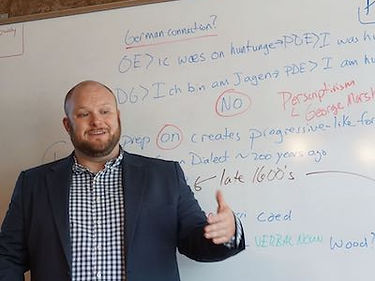
Research Agenda

My research is situated in post-secondary world language instruction contexts, centering the experiences of graduate teaching assistants. It employs Deleuzoguattarian concepts to understand language teacher identity in a way that emphasizes the complex and fluid nature of identity and the classroom. As a qualitative researcher, I value the importance of researcher positionality and strive to incorporate reflexive, innovative, yet transparent methodologies that prioritize the well-being of my participants. The goal of this research is to contribute to the ongoing body of scholarship seeking to better understand the role of teacher identity in education and supports the development of more equitable and inclusive teaching practices.
Research Interests
Post-secondary world language instruction; pedagogical practices and training of graduate teaching assistants; language teacher identity; language teacher socialization and professionalization; second language learning; post-qualitative research methodologies; Deleuzoguattarian frameworks; narrative inquiry; researcher positionality
A Deleuzoguattarian Investigation of the Language Teacher Identities of World Language Graduate Teaching Assistants

Current Projects
Richard Giblett (2009). Mycelium Rhizome. Pencil on paper.
My dissertation research employed Deleuzoguattarian concepts to understand language teacher identity in a way that emphasizes the complex and fluid nature of identity and the classroom. My research is situated in post-secondary world language instruction contexts, centering the experiences of graduate teaching assistants through the use of narrative inquiry, photovoice, observations, and interviews.
As a qualitative researcher, I value the importance of researcher positionality and strive to incorporate reflexive and transparent methodologies that prioritize the well-being of my participants. This research contributes to the ongoing body of scholarship that seeks to better understand the role of teacher identity in education and supports the development of more equitable and inclusive teaching practices.

Exploring Researcher Subjectivity Through the Kinetic Art of Yaacov Agam
Yaacov Agam (1972-1974). Aménagement de l'antichambre des appartements privés du Palais de l'Elysée pour le président Georges Pompidou. Oeuvre en 3 dimensions.
I'm not an art expert, but when I first engaged with Agam's Aménagement de l'antichambre des appartements privés du Palais de l'Elysée pour le président Georges Pompidou, I couldn't help but make connections to the way researchers move through a project. The work was "created using colored beveled elements and offers the viewer abstract compositions that change depending on the angle of view the viewer adopts…The layout offers the vision of an abstract and geometric universe energized by the renewed play of its themes, perceptible according to the visitor’s movements…and suggests, in pictorial form, the permanent metamorphosis of the visual universe].” (Ameline, 2007, p. 26). I'm currently using Agam's art to work through my own research subjectivities in my dissertation to push back against static conceptualizations that have dominated the use of positionality and subjectivity in qualitative research and have a pending publication that details this.
Recently Publications

Wassily Kandinsky (1923). Composition VIII. Oil on Canvas.
This publication reported a qualitative case study of an often-overlooked language teacher: The graduate teaching assistant (GTA). The study relied on the theoretical premise that teachers’ professional learning is a process of identity construction. During this process, teachers experience tensions as they are introduced to professional authoritative discourses (ADs) and negotiate internally persuasive discourses (IPDs). In the qualitative case study of Karina, a GTA at a US University (State University, henceforth), we addressed the research question: How did Karina navigate her identity tensions as a GTA in the German program at State University? Our findings detailed the effect of authoritative discourses in the program, and a GTA's agency in developing her own IPD.
You can read this work here: https://www.sciencedirect.com/science/article/pii/S0898589822000675

My colleague and I reviewed science education articles from the past four years to see how well they reflect strong qualitative research practices. We asked: To what extent do qualitative studies on secondary science teaching follow the standards outlined in leading methodology texts? Using a systematic review process, we searched relevant databases with terms like “secondary education” and “science teaching,” screened hundreds of peer-reviewed, English-language, full-text articles, and narrowed them down through a three-step review of titles, abstracts, and methods sections. We found that relatively few studies deeply engaged with qualitative methodologies. Some claimed to use specific approaches but lacked key elements—like researcher reflexivity or member-checking—that help establish credibility and trustworthiness. That said, a few standout studies did model high-quality qualitative work—true diamonds in the rough.